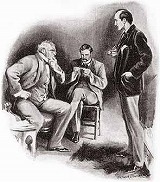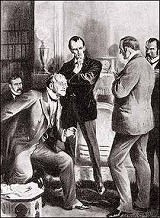Our client smoothed down his unbrushed hair and felt his unshaven chin.

“You are right, Mr. Holmes. I never gave a thought to my toilet. I was only too glad to get out of such a house. But I have been running round making inquiries before I came to you. I went to the house agents, you know, and they said that Mr. Garcia’s rent was paid up all right and that everything was in order at Wisteria Lodge.”
“Come, come, sir,” said Holmes, laughing. “You are like my friend, Dr. Watson, who has a bad habit of telling his stories wrong end foremost. Please arrange your thoughts and let me know, in their due sequence, exactly what those events are which have sent you out unbrushed and unkempt, with dress boots and waistcoat buttoned awry, in search of advice and assistance.”
Our client looked down with a rueful face at his own unconventional appearance.
“I’m sure it must look very bad, Mr. Holmes, and I am not aware that in my whole life such a thing has ever happened before. But I will tell you the whole queer business, and when I have done so you will admit, I am sure, that there has been enough to excuse me.”
But his narrative was nipped in the bud. There was a bustle outside, and Mrs. Hudson opened the door to usher in two robust and official-looking individuals, one of whom was well known to us as Inspector Gregson of Scotland Yard, an energetic, gallant, and, within his limitations, a capable officer. He shook hands with Holmes and introduced his comrade as Inspector Baynes, of the Surrey Constabulary.
“We are hunting together, Mr. Holmes, and our trail lay in this direction.” He turned his bulldog eyes upon our visitor. “Are you Mr. John Scott Eccles, of Popham House, Lee?”
“I am.”
“We have been following you about all the morning.”
“You traced him through the telegram, no doubt,” said Holmes.
“Exactly, Mr. Holmes. We picked up the scent at Charing Cross Post-Office and came on here.”
“But why do you follow me? What do you want?”
“We wish a statement, Mr. Scott Eccles, as to the events which led up to the death last night of Mr. Aloysius Garcia, of Wisteria Lodge, near Esher.”
Our client had sat up with staring eyes and every tinge of colour struck from his astonished face.
“Dead? Did you say he was dead?”
“Yes, sir, he is dead.”
“But how? An accident?”
“Murder, if ever there was one upon earth.”

“Good God! This is awful! You don’t mean - you don’t mean that I am suspected?”
“A letter of yours was found in the dead man’s pocket, and we know by it that you had planned to pass last night at his house.”
“So I did.”
“Oh, you did, did you?”
Out came the official notebook.
“Wait a bit, Gregson,” said Sherlock Holmes. “All you desire is a plain statement, is it not?”
“And it is my duty to warn Mr. Scott Eccles that it may be used against him.”
“Mr. Eccles was going to tell us about it when you entered the room. I think, Watson, a brandy and soda would do him no harm. Now, sir, I suggest that you take no notice of this addition to your audience, and that you proceed with your narrative exactly as you would have done had you never been interrupted.”
Our visitor had gulped off the brandy and the colour had returned to his face. With a dubious glance at the inspector’s notebook, he plunged at once into his extraordinary statement.